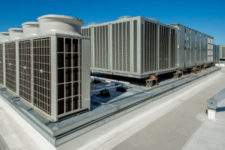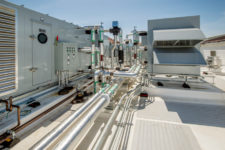It’s that cooling tower time of year – November 1st marks the annual certification due date for cooling towers. It’s also the “end of the cooling season,” where many owners and managers will be shutting down their systems for the colder months of the year.
Here’s what you need to know to manage the certification and shutdown processes and stay in compliance:
Annual Certification
- Cooling tower Annual Certifications must state that the cooling tower has been inspected, cleaned, and disinfected in compliance with applicable laws and the maintenance and program plan. You can read more about general cooling tower requirements in our previous blog posts (the latest one linked here), and view the DOHMH sample checklist here.
- Any deviations from the MPP or instances of noncompliance must be documented and accompanied by relevant corrective actions.
- Annual Certification information must be uploaded on the NYC Cooling Tower Portal, located here. You can view the DOHMH’s full instructions for submitting information here.
- “If it’s registered, it requires certification.” The only towers that don’t require annual certification are ones that have received the Department-issued “Receipt of Decommissioning” prior to 11/1.
Shutdown Guidance
- Chapter 8 outlines the requirements for shutting down your cooling tower system – check them out here.
- REMINDER: Shutdown is not the same as cooling towers operating “on an intermittent basis or in standby mode.” Systems that are not fully shutdown must continue to meet routine maintenance and operational standards as required, and receive adequate amounts of biocide (to prevent Legionella growth).
- Select a shutdown date – pick a date when you know the cooling tower will no longer be needed (weather, or other factors can help).
- Once you’ve determined a shutdown date, the process begins by putting the tower equipment out of operation and draining all the water from the system (dry layup).
- Record the shutdown date in your operational records and in the Registration Portal. You should return to the Portal on a regular basis to review the season start and end dates, any maintenance or management team changes, and more.
- As always, records kept onsite must include all your documented, dated activities, per the requirements.




